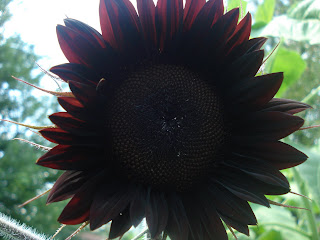
I really didn't think this book was going to be much of an eye-opener. As a bonified nature lover and parent, I know just how important the connection between child and wilderness is. I see it every winter when my children are forced indoors for most of the time and at the 4th of July celebration when my 2-year-old's greatest joy is not the fireworks but catching lightening bugs. But this book wasn't just about that connection and how it's being lost, it was about revolutionizing our country, our culture, our way of living to guarantee the health of our children and ourselves. Louv runs the gamut, sharing conversations with parents and children, teachers, scientists, environmentalists, experts in child development, and religious leaders alike. Each of these conversations serves to further the main theory of his book, that children today are growing ever more disconnected from nature.
The book is split into seven sections. The first four were exactly what I expected of this book, discussing the importance of nature to human health, the factors that have led to the distancing between children and nature, and a why a reunion is in order. There is much discussion of forts, tree houses, childhood obesity and ADHD. These first sections can be summed up by this quote: "To take nature and natural play away from children may be tantamount to withholding oxygen." (pg. 108)
The last three parts of the book were very enlightening for me, though. Despite my personal involvement in the back-to-the-land movement, it's been a long time since I've looked at the movement nationwide, let alone globally. Louv's encouragement for the "zoopolis" was refreshing, and he agrees with scientists who now advocate corridors for wildlife travel/migration rather than isolated pockets of habitat. The author even touched on the fact that many environmentalists see only the problem of overpopulation when they look at children and therefore disregard the needs of our little ones. His take on this matter was encouraging for a soon-to-be mother of four.
There is an extensive discussion of education reform in the book, and I wholeheartedly agree with Louv's assertion that parents alone cannot solve this problem. I did, however, find it rather interesting that he never mentioned homeschooling as an option for providing children greater interaction with nature throughout their school years. He mentions very briefly at the end of the book that one of the families he had discussed throughout homeschools, but that's it. There is no probe as to why they homeschool or whether or not this form of education is more or less likely to produce nature-deprived children.
I was also a bit disconcerted by the fact that there was no discussion of how parents should go about enacting change in their local school systems. Perhaps it wasn't the intent of the author to encourage such a thing, but I felt, after reading the portions on nature and education, that making my parental voice heard even
before my children enter the school system was not only what I wanted to do but what I
had to do as a mindful parent. If anyone has any ideas or stories to share on this matter, please comment or contact me.
Overall, the book was an easy read. I didn't find it to be depressing, as many "child deficit" books can be. The author sprinkled stories throughout the facts and studies, making it enjoyable and heartening. I don't plan to add the book to my personal library, but I would recommend everyone (not just parents) check this book out from their public library.

















